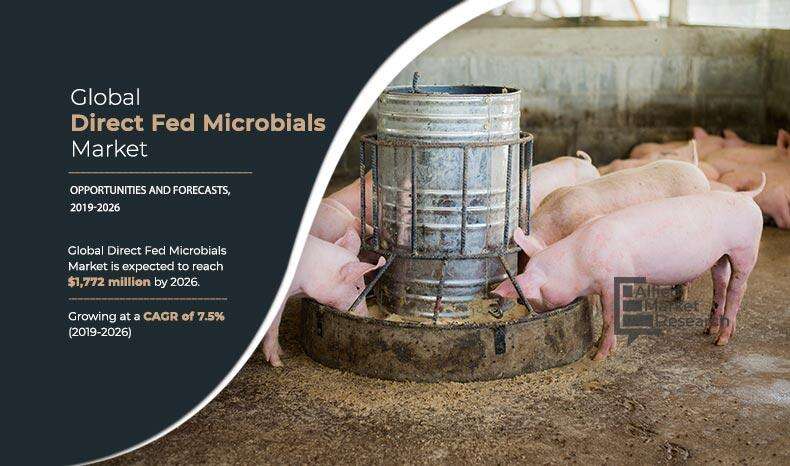The research report published by Allied Market Report states that the global direct fed microbial market is estimated to reach $1,772 million by 2026. The report provides an in-depth analysis of growth factors, opportunities, market trends, key segments, and competitive landscape. Current market conditions and the future scenario of various regions have been analyzed in the report to help market players in devising expansion strategies. Moreover, it includes country-wise analysis of each region. Product portfolio and business segments of leading market players outline the competitive scenario. The report provides insights to help investors, stakeholders, and new entrants to determine potential opportunities and tap on them to gain competitive advantage.
Get Free Sample PDF of Direct Fed Microbial Market:
https://www.alliedmarketresearch.com/request-sample/6494
Covid-19 Scenario:
• The Covid-19 pandemic and followed by lockdown has affected several manufacturing industries.
• The prolonged lockdown resulted in a disrupted supply chain and increased the prices of raw materials.
• However, as the world has been recovering from the pandemic, the market is estimated to get back on track.
Increase in demand for meat & milk consumption and rise in profitability at same cost are the major factors driving the market growth of direct fed microbial market. Furthermore, significant surge in human population and increase in demand for protein content in the diet propel the market growth for direct-fed microbial. In addition, probiotics aid nutrient absorption by breaking down the complex compounds, which, in turn, helps to reduce the cost of animal production and increases the profitability of the animal producers. However, enforcement of stringent regulations regarding the vigorous usage of these microorganisms in animal diet and increase in cost of production are the major factors hampering thedirect fed microbial market growth. Conversely, ban on the usage of antibiotics in animal diet in the developed nations such the U.S., Germany, and the UK and rise in animal health concerns are anticipated to offer remunerative opportunities for market expansion in the near future.
By product, the lactobacillus segment accounted for 62% of the total direct fed microbialmarket share in 2018, and is expected to exhibit a prominent growth rate in the near future, owing to its increased usage in the livestock diet. Lactobacillus is the most widely used probiotics in the livestock diet, as it is considered safe and more beneficial as compared to the other bacterial species.
By livestock, the poultry segment dominated the direct fed microbial market in 2018, and is anticipated to maintain its dominance during the forecast period. This is attributed to the fact that poultry is the most consumed animal meat across the globe. Furthermore, individuals prefer poultry other than other livestock animals.
Inquire Before Buying:
https://www.alliedmarketresearch.com/purchase-enquiry/6494
The Major Key Players Are:
• Koninklijke DSM N. V
• Bio-Vet
• Archer-Daniels-Midland Company
• CHR. Hansen A/S
• E. I. Du Pont De Nemours And Company
• Novozymes A/S
• Kemin Industries, Inc.
• BASF SE (BASF Corporation)
• Evonik Industries Ag
• Adisseo.
About Us:
Allied Market Research (AMR) is a full-service market research and business-consulting wing of Allied Analytics LLP based in Portland, Oregon. Allied Market Research provides global enterprises as well as medium and small businesses with unmatched quality of “Market Research Reports” and “Business Intelligence Solutions.” AMR has a targeted view to provide business insights and consulting to assist its clients to make strategic business decisions and achieve sustainable growth in their respective market domain.
Contact: David Correa
5933 NE Win Sivers Drive
#205, Portland, OR 97220
United States
USA/Canada (Toll Free): +1-800-792-5285, +1-503-894-6022
UK: +44-845-528-1300
Hong Kong: +852-301-84916
India (Pune): +91-20-66346060
Fax: +1(855)550-5975
help@alliedmarketresearch.com
Web: https://www.alliedmarketresearch.com
